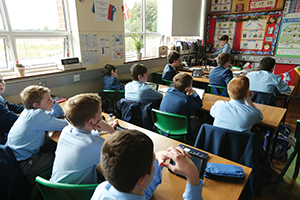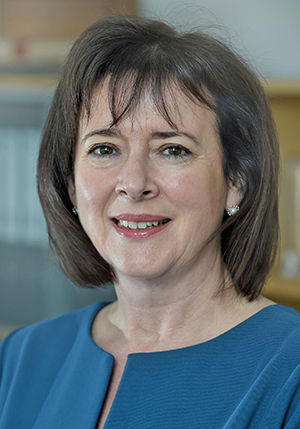Improving inspections
 Noelle Buick Chief Inspector at the Education and Training Inspectorate explains her desire to make our education system work for every child.
Noelle Buick Chief Inspector at the Education and Training Inspectorate explains her desire to make our education system work for every child.
Noelle Buick, Chief Inspector at the Education and Training Inspectorate (ETI) has spoken of the need to ensure that the education system in Northern Ireland is universally good for everyone.
Speaking at the first of what ETI hopes will be a biennial event to provide information on the inspection process and to share updates on the development of school inspections, Buick was positive about the overall impact of our educational facilities. She highlighted the fact most pupils in schools achieve well and that our work based learning sector does good work addressing the significant barriers to learning and future employment.
Need to improve
However, despite this praise, Buick claimed our schools still have a way to go before they can be recognised as world class. The Organisation for Economic Co-operation and Development’s (OECD) list of top performing countries for education ranks the United Kingdom, including Northern Ireland, some way behind the top countries, especially those in South East Asia.
Buick feels that schools here need to improve in international comparisons of literacy and numeracy at 15; the variability of outcomes depending on socio-economic background and the variability in the quality of education and training. “We know that good leadership and management and high quality learning and teaching make a difference. Our challenge is to make sure it is universally good for everyone,” she said.
Speaking about the inspection process and how she hopes to improve it, Buick expressed her desire to remove the perception that schools and providers have to get ready for inspection. She also claimed that the inspection process is an important catalyst for raising standards and promoting improvement by ensuring that the inspection process:
• highlights and shares best practice;
• identifies, improves and supports poor provision;
• helps to build capacity for ongoing improvement;
• assures parents their children are safe and well educated;
• provides government with evidence-based policy advice and robust accountable mechanisms.

Buick also highlighted the OECD study of evaluation and assessment in Northern Ireland published in 2013. The study praised the inspection process in Northern Irish schools, claiming there are well established mechanisms for external school evaluation, that inspection is based in quality assurance and emphasises school improvements and that the framework for inspection is (i) supported by the international effectiveness research and (ii) is promoted for school use which ensures transparency in the criteria used.
Buick is keen to further improve the service, recognising that, “inspection alone will not improve the quality of provision. It is a partnership with those we inspect and the other stakeholders.”
The inspection process has already undergone some change as ETI attempts to improve the service. The changes made so far include:
• a reduction in the notice period for inspections to two weeks to reduce lead in time;
• one week inspection findings are now reported on Friday so schools and providers don’t have to wait over the weekend to find out the outcome;
• feedback is provided after lessons so teachers do not have to wait until the end of the inspection to learn the findings;
• online questionnaires for staff and parents have been introduced;
• revised, cleaner report structures have been in place since September 2013;
• streamlining the two day primary school inspection process.
Having made these improvements, ETI is now focused on improving transparency with its partners. Buick hopes to do this by disclosing in further detail, more of the criteria for inspection, opening the inspection process and continually learning from the inspection experience to make further improvements as and where they can.
Buick also revealed that prior to an inspection a reporting inspector will meet with principals for a scheduled pre-inspection day. It is hoped this visit will remove some of the anticipation from the teaching staff during the inspection process.
Aims
In striving to improve the inspection process Buick realises it is important to have a full understanding of what an inspection should be and what it hopes to achieve. She expressed her hope that staff and schools and other provides recognise the inspection as something that can:
• be challenging but also positive and constructive;
• be highly credible and fully understood;
• be flexible and responsive to a changing landscape;
• demonstrate partnership working and collaborative responsibility;
• have a positive impact on improvement beyond the inspection itself.
Buick also urged everyone involved in education to:
• aspire higher so that learners of all ages achieve their full potential;
• enable more learners through high quality learning, teaching and pastoral care to raise ambition and aspiration and reduce the variability in life chances for children and young people;
• expect better to ensure that excellence is achieved.
Speaking about the common interest between inspectors, schools and providers, Buick stressed her belief that everyone involved in the process wants to see the inspection go well but at the same time, be challenging with a strong focus on good quality education and training for all learners. In order to achieve this Buick stressed the need for inspections to be credible and fully understood.
“ETI’s mission is to promote improvement in the interest of all learners and we can only do that when the organisations we inspect work with us,” said Buick. “It is ETI’s role to promote improvement through professional dialogue on inspection and district visits and by identifying areas for improvement as well as areas of good practice that can be shared.
“It is for the organisation to effect the improvement to enable all learners to make progress. As part of that process I want to make inspection as accessible and transparent as possible.”





